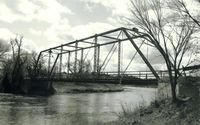Difference between revisions of "NRHP: Borman Bridge"
(Created page with "Borman Bridge == Borman Bridge== NRHP Reference #: 92000751 NRHP Listing Date: 19920629 ==Loca...") |
|||
| Line 3: | Line 3: | ||
== Borman Bridge== | == Borman Bridge== | ||
| − | NRHP Reference #: 92000751 | + | NRHP Reference #: [https://npgallery.nps.gov/AssetDetail/NRIS/92000751 92000751] |
NRHP Listing Date: 19920629 | NRHP Listing Date: 19920629 | ||
Latest revision as of 09:05, 20 February 2018
Contents
Borman Bridge
NRHP Reference #: 92000751
NRHP Listing Date: 19920629
Location
2.3 mi SE of Valentine, Cherry County, Nebraska
View this property's location
View all NRHP properties on this map.
Summary
On February 16, 1916, the winter ice on the Niobrara River near the western edge of Cherry County began to break up as the river's level rose quickly. The flood that resulted moved downstream, pushing the ice pack in front of it. Before it passed through the county's eastern edge two days later, the flood had swept away fourteen bridges and damaged or destroyed seven others. In the aftermath of the flood, a representative from the Canton Bridge Company conferred with the county commissioners about rebuilding several of the bridges. The commissioners visited the site of the Borman Bridge (1900) southeast of Valentine with a Canton official and later ordered a replacement span from the Ohio-based company. Using steel rolled by Cambria, Canton erected this pinned Pratt through truss within a month. Of the fourteen Cherry County bridges surveyed on the Niobrara River, thirteen are medium span Pratts. Due in part to the flood, these Niobrara River bridges represent the best preserved group of county trusses in the state. The Borman Bridge is significant as a well-documented example of a mainstay structural type.
Further Information
Bibliography
About the National Register of Historic Places
The National Register of Historic Places (NRHP) is the country’s official list of historically significant properties. To be eligible for the NRHP a property must generally retain their historic appearance, be at least 50 years old, and have the potential to be documented as historically or architecturally significant at either the local, state, or national level. The National Register of Historic Places is a National Park Service program administered by the Nebraska State Historical Society for the state of Nebraska. Visit the Nebraska State Historical Society's website to learn more about the program.
